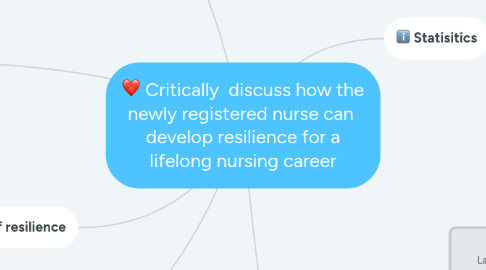
1. Emotional distancing
1.1. Hope and spirituality
2. Conflict training
2.1. Councelling
3. Promotion
3.1. Available Support
3.1.1. Information booklets given on employment
3.1.2. Debriefing sessions
3.2. Mindfullness
3.2.1. Staff training given
3.3. Meaningfull staff recognition
3.3.1. Perceptor recognition
3.4. Resilience
3.4.1. Foureur and colleagues (2013), resiliency is a process of adaption through experience when facing adversity.
3.4.2. Student training
3.5. Training
3.5.1. EOL
4. Effects of lack of resilience
4.1. Staff burnout
4.1.1. Defined as a response to physical or emotional stressors that leads to exhaustion, self-doubt, cynicism, and ineffectiveness
4.1.1.1. commonly reported in high-stress areas, including critical care, pediatrics, and oncology.
4.1.2. 5 Stages
4.2. Compassion fatigue
4.2.1. Poor patient satisfaction
4.3. Staff leaving the profession
4.3.1. Increasing staff shortage
4.4. Moral distress
4.5. Depersonalization
5. Statisitics
5.1. A Robert Wood Johnson Foundation study found that 18% of nurses experience depression, which is twice the rate of the general public and may develop from burnout.
5.2. Several factors contributed to burnout and possibly affected resiliency in the healthcare setting. Workload, moral distress, poor support systems, and bullying were identified in three studies (Marais et al., 2016; Rushton et al., 2015).
5.2.1. 5 Nurses are often exposed to ethical dilemmas, particularly when the beliefs of caregivers and patients don’t match.
5.2.1.1. One study found that when caregiver and patient values conflict, caregivers’ sense of integrity may be compromised.6 Caring for patients in these situations can create an internal conflict for nurses, leading to burnout and secondary trauma.
5.2.2. Nurses exposed to prolonged stress experience anxiety, depression, sleep deprivation, compassion fatigue, nurse turnover, depersonalization, and burnout (Mealer et al., 2014; Potter et al., 2013).
5.3. Mindfulness-based stress reduction (MBSR) training, emotional distancing, conflict training, and event trigger exercises were found to have positive impact on resiliency (Dolan et al., 2012; Mealer et al., 2014; Rushton et al., 2015). (MEDSURG article)
6. Barriers
6.1. Lack of funding
6.2. Lack if time
6.3. Lack of education
6.4. Lack of training
6.5. Lack of staff
6.5.1. Although strategies to prevent burnout have been identified, growing challenges in the work setting coupled with a nursing shortage continue to contribute to nurse burnout (Rushton et al., 2015).

